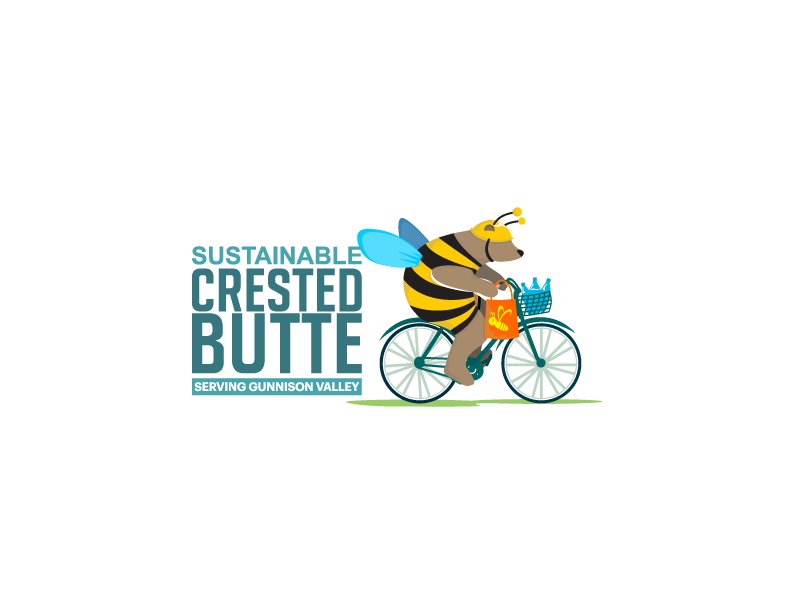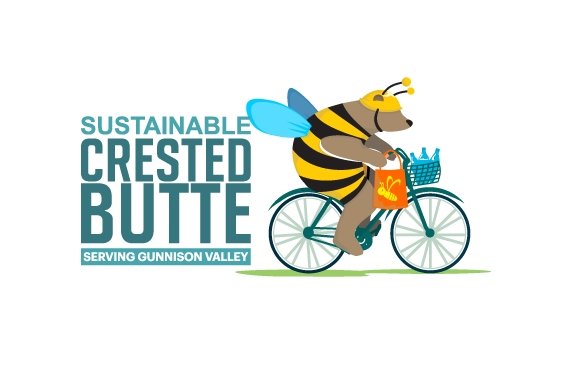
Living in a remote valley of Colorado surrounded by stunning public lands, wildlife habitat, and historic ranches brings many advantages, although easy sustainable waste management likely isn’t one of them.
Considering the three hour-plus journey to the Front Range, reckoning with our valley’s waste stream in an efficient, environmentally friendly manner can prove a big challenge. For those thinking about how to reduce and manage the valley’s waste outputs, public education, our region’s economy and relatively small scale of waste materials, and transportation costs (both in dollars and in carbon emissions) are constantly top of mind.
Thankfully, there is a local nonprofit serving the Gunnison Valley that is dedicated to tackling Gunnison country’s waste issues head-on. “Our core value is to build a zero-waste future for Gunnison County,” says Amy Newfield, the Vice President of the environmental advocacy nonprofit Sustainable Crested Butte. Newfield is a jack-of-all-trades for Sustainable CB, working across several of its flagship programs, predominantly the Recycle Train and Waste-Free Events.
Newfield first came to Colorado for the region’s skiing in her high school days, and later visited Crested Butte in the summer with her friend’s family. “It was a huge eye-opener– the flowers are gorgeous, [plus] there’s no humidity,” recounts Newfield. After college, Newfield and her friend identified three options within Colorado to scout out for their new home: Steamboat Springs, Telluride, and Crested Butte. “We came to Crested Butte first, and basically we never left,” says Newfield.
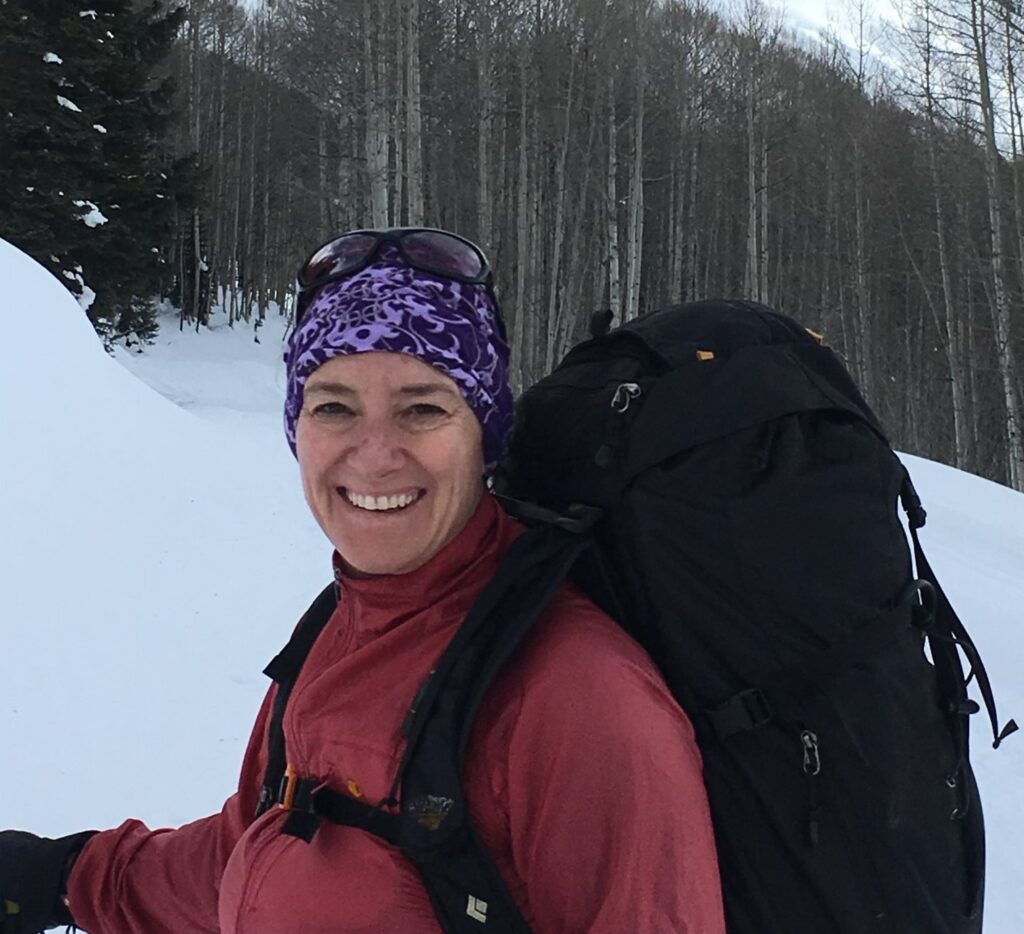
Newfield has now spent close to 30 years in Crested Butte, an experience which has shaped her in many ways, including strengthening her passion for environmentalism, that she credits to several amazing science teachers in the Washington D.C. area, where she grew up. “I’ve always felt a strong connection to these mountains, and to this community, and [joining] Sustainable Crested Butte was just another way to [maintain] that connection,” adds Newfield.
The roots for Sustainable CB were planted in 2015 with Benjamin Swift, then a high school student at the Crested Butte Community School. Swift obtained the organization’s first reusable bags (which blossomed into the organization’s Boomerang Bag initiative) and launched the initial campaign to ban plastic bags (the ban went into effect in 2018). With these efforts, Swift set the ball in motion for what would soon become Sustainable CB, a waste-focused advocacy organization serving the entire Gunnison Valley.
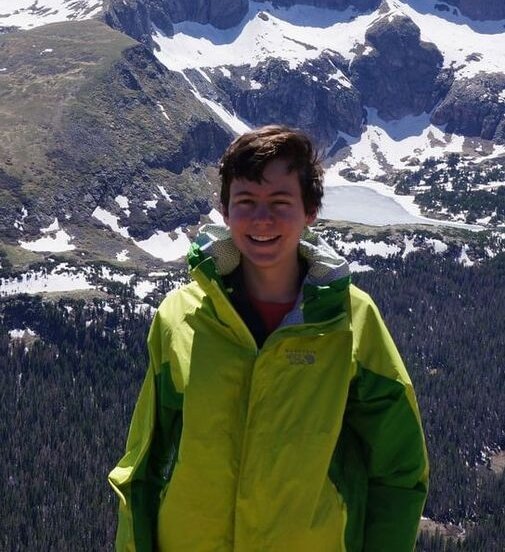
Sustainable CB’s central mission remains waste reduction, an initiative that takes many different forms. The most recent and splashy of these initiatives is the Recycle Train, a program that gathers and hauls hard-to-recycle items from the Gunnison Valley to Eco-Cycle’s Center for Hard-to-Recycle Materials (CHaRM) in Boulder.
The program’s inception came from a former Sustainable CB board member with a habit of stockpiling plastic film in their car to later recycle on the Front Range. The plastic film storage habit quickly expanded to transferring others’ plastic film, later expanding the storage to a garage, then a shed, and soon after, a pickup program began for local businesses.
Over time, the initiative continued to grow, adopting its current monthly drop-off format in July 2021. For the first few months, Newfield and her colleagues rented a U-Haul to transport the collected waste. Sustainable CB then acquired grant funding from the State of Colorado to purchase a trailer for the monthly collections. To date, Sustainable CB has diverted more than 16,000 lbs. of hard-to-recycle waste via the booming Recycle Train program.
Newfield is the first to admit that recycling can be difficult, especially here in the Gunnison Valley. Ironing out what materials can and cannot be accepted for transportation to Eco-Cycle has been a learning curve. “Within textiles, you can take something that is ripped and stained, but it’s [otherwise] clean. But if that same ripped and stained textile comes in, but it’s dirty, you can’t take it,” notes Newfield, who adds that the program is always looking for volunteers to help collect, clean, and count received material for its upcoming dates, the next of which is on Saturday, March 19, followed by Saturday, April 16.
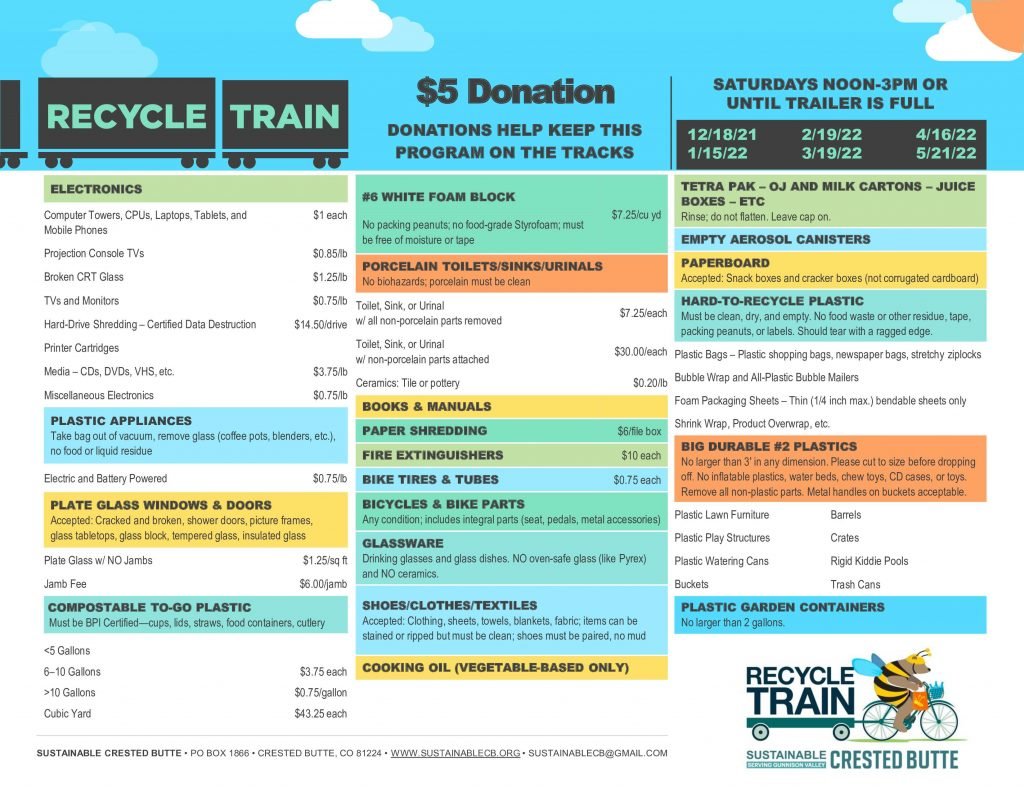
Newfield says that Sustainable CB is modeling themselves after their current partner, Boulder-based Eco-Cycle, which has become a prototype for successful recycling in Colorado. The Crested Butte nonprofit is hoping to make a big step towards Eco-Cycle’s level of functioning by obtaining their own facility that would open four or five days per week for drop offs and temporary storage. They are also looking to replace their trailer loads with larger, semi loads, which would reduce the overall greenhouse gas emissions associated with transporting waste materials.
When considering the Recycle Train, Newfield wants people to think beyond electronic waste as the only hard-to-recycle materials, and focus on everyday materials like plastic film, styrofoam, and tetra pack (those foil-lined cartons with plastic lids that are recyclable only where facilities exist), all of which can be recycled via the Recycle Train program.
Newfield is struck by the inspiration that the Recycle Train has provided to the community. Crested Butte students have taken an interest in helping out with material collection, and she has received emails from Recycle Train admirers inquiring about launching similar waste collection programs in both Alma and Creede, Colorado.
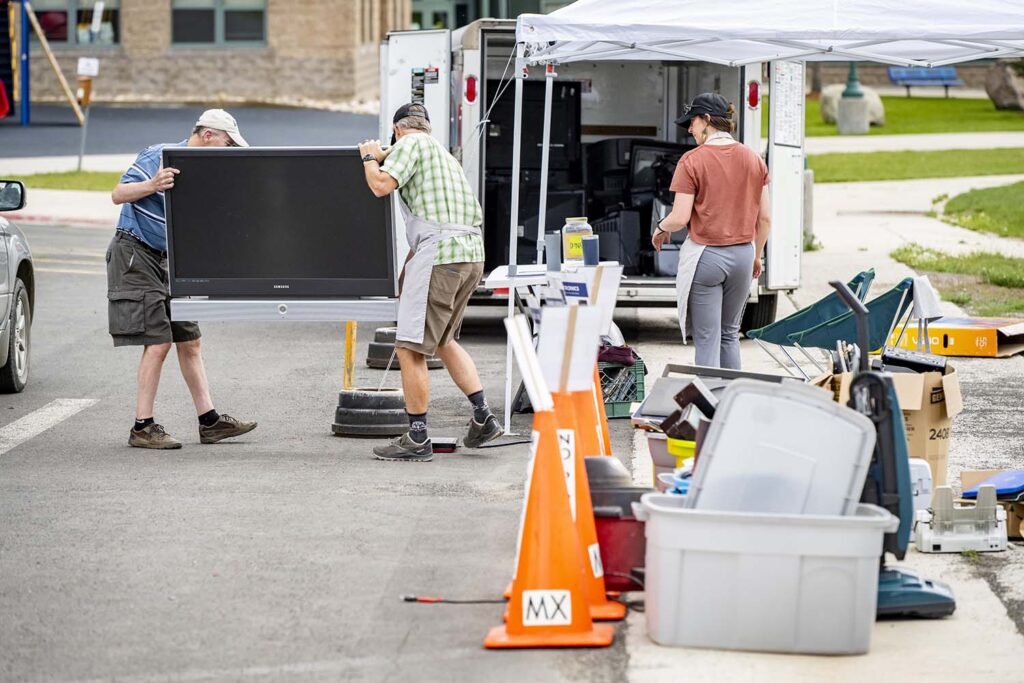
Crested Butte plays host to a lot of exciting events, particularly over the summer months. Recognizing the need for coordination to reduce waste impacts, Sustainable CB operates a Waste-Free Events program, renting out dishware to vendors and groups as large as 300 people to divert single-use plates, cups, and other common event materials. In the first four years of Sustainable CB’s Waste-Free Events program, the organization diverted more than 80,000 single-use items away from the landfill in conjunction with their event partners.
At a broader scale, Sustainable CB is working on a valleywide waste collection plan, which will hopefully include a curbside compost pickup program and an industrial composter. Sustainable CB is also supporting the Town of Crested Butte with climate planning and outreach to reduce the community’s waste footprint. “The Crested Butte Climate Action Plan anticipates that if we do nothing to reduce our waste in this community, greenhouse gas emissions from our landfill will grow 19% between 2017 and 2030,” notes Sustainable CB’s webpage.
The Town of Crested Butte recognizes the importance of waste reduction for key climate goals, and is preparing for a waste-free event mandate that will formally take effect in 2023. “Any event vendor that pulls a permit from the town, Fourth of July, Fat Tire Bike Week, Crested Butte Arts Festival, they will all be required to be zero waste,” notes Newfield. While recycling will be used as an intermediate step, Newfield adds that recycling is not truly zero waste, and will be phased out over time as the mandate takes full effect.
Sustainable CB will be rolling out its implementation plan for the town’s transition to waste-free events, expected by late spring 2022. The town will begin implementation over the coming summer with voluntary compliance, transitioning into required compliance in 2023. Sustainable CB will be available to serve as a waste consultant for event vendors, and the nonprofit will also take the lead on community outreach. “A big part of this [waste issue] is education, and reaching as many people as we can to help them make different lifestyle choices,” adds Newfield.
In the short term, Sustainable CB is finalizing another grant application to Colorado’s Recycling Resources Economic Opportunity (RREO) program and is eyeing a storage space in Gunnison to house their Recycle Train collections before the long trip to Boulder. One day, providing material quantities continue to increase, Sustainable CB will work directly with the material processors (as far away as Wisconsin), instead of utilizing Eco-Cycle as an intermediary. Sustainable CB is also expanding its fundraising efforts, building relationships with individual donors to expand its programs in the future. The fundraising component, Newfield admits, is a bit out of the organization’s comfort zone.
For Newfield, the most rewarding part of her work is seeing the effects Sustainable CB is having locally. “It’s really easy to get overwhelmed with the doom and gloom of our waste, and [with] climate change…but really being able to focus on the things that we can do, and seeing that we are making a difference, is [so important]. Making a difference translates to helping save my home,” says Newfield, adding: “Sustainable CB is an organization working to bring the valley together for the cause of preserving our natural beauty.”
On April 15, Sustainable CB’s Recycle Train will come to Western’s campus. To get involved, please email Ashley Woolman at awoolman@western.edu. Additionally, students can always head up to Crested Butte to volunteer with monthly Recycle Train collections.
Other volunteer options for students and community members can be found HERE and include opportunities in administrative work, social media, and web design. If you are interested, you can also reach out directly via email: sustainablecb@gmail.com

